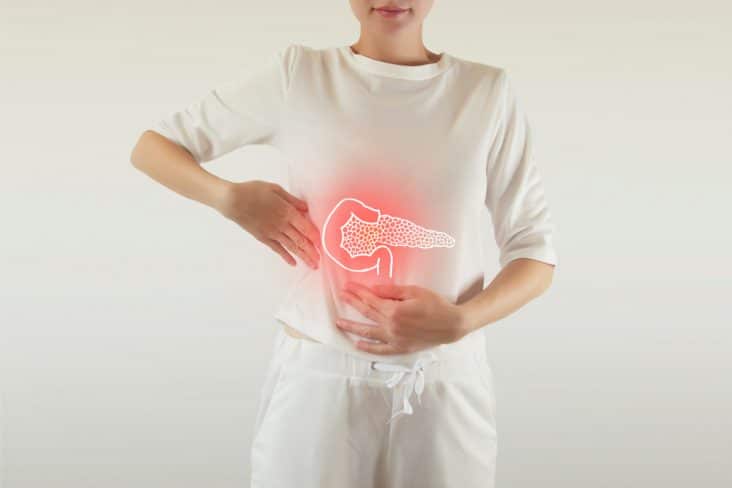Author : Dr Suhirdan Vivekanandarajah
Pancreatitis is a rare digestive disorder that results in an inflamed pancreas, which is a large gland located behind the stomach and next to the upper part of the lower intestine.
Keeping your pancreas healthy is important because it secretes powerful enzymes that facilitate the digestion of carbohydrates, proteins, fats, and hormones, specifically insulin and glucagon, which are involved in the body’s blood glucose metabolism.
Inflammation and local damage to the pancreas occurs when these powerful enzymes are activated while they’re in the pancreas, before reaching the small intestine in order to support digestion. In such instances, pancreatitis can result in complications such as bleeding, tissue damage, infection, and organ damage.
Pancreatitis is categorised as being either acute or chronic. Acute pancreatitis is characterised by an isolated episode of sudden abdominal pain and increased blood enzyme levels and chronic pancreatitis is characterised by severe abdominal pain and loss of pancreatic function, which develops after multiple episodes of acute pancreatitis.
Causes
Data suggests that about 80% of cases of acute pancreatitis is caused by gallstones and alcohol ingestion. Other causes of acute pancreatitis may include:
- Medication
- Infections
- Trauma or surgery involving the abdomen
- Autoimmune disease
- High triglyceride levels
The most common cause of chronic pancreatitis, which accounts for about 70% of patients, is prolonged use of alcohol. It also typically develops after multiple episodes of acute pancreatitis and may last between a few months to a few years.
Other causes of chronic pancreatitis include:
- Gallbladder disease
- Hyperparathyroidism
- Cystic fibrosis
- Hereditary pancreatitis
Symptoms
Acute pancreatitis could cause gradual or sudden pain in the upper abdominal area, which may radiate to the back and persist for a few days. You may also observe other symptoms such as:
- Nausea and vomiting
- Worsening pain after meals
- Tenderness in the abdomen
- Feeling weak and lethargic
- Fever and chills
Chronic pancreatitis could also cause intermittent or constant pain in the upper abdomen that may be disabling. You may also experience the following symptoms:
- Increased heart rate
- Diarrhoea or greasy and oily stools due to the malabsorption of food
- Diabetes
- Unexplained weight loss
Diagnosis
Blood tests
If you are suspected of having acute pancreatitis, you may be asked to undertake a blood test to confirm this diagnosis. Your blood will be tested for elevated levels of digestive enzymes, amylase and lipase, which strongly suggest acute pancreatitis. This type of test will not be useful if you only have chronic pancreatitis.
Other blood tests used to diagnose acute pancreatitis include:
- Liver and kidney function tests
- Tests for infection
- Tests for autoimmune markers
- Lipid profile
Pancreatic function test
This test is the most accurate way to assess the exocrine function – fat absorption – of your pancreas. It involves inserting a tube into your small intestine to collect pancreatic secretions.
Imaging tests
X-ray, ultrasound, CT scan or MRI of the abdomen could be performed to visualise the pancreas and to evaluate the extent of inflammation, as well as any potential complication that may arise, such as bleeding or fluid formation.
Treatment
Treatment may vary depending on the underlying cause of pancreatitis. However, you may be asked to get yourself admitted to a hospital to begin treatment. The recovery process generally involves the following:
- Abstinence from alcohol
- Fasting to help your pancreas rest and recover
- Administered IV fluids to prevent dehydration
- Pain medications (IV or oral)
Once your symptoms are under control, treatment may shift to addressing the underlying causes of pancreatitis, including:
- Endoscopic treatment to remove obstructions in the bile duct
- Gallbladder surgery to remove gallstones
- External administration of pancreatic enzymes and insulin
- Pancreatic surgery to drain fluid from your pancreas or to remove diseased tissue
Request more information on the diagnosis and treatment of acute and chronic pancreatitis
Whether you find yourself faced with an isolated episode of pancreatitis or have experienced multiple episodes of pancreatitis, you must receive treatment before any complications arise.
If you experience any pain in your upper abdomen, consult an experienced gastroenterologist to confirm your diagnosis and begin treatment for pancreatitis.

